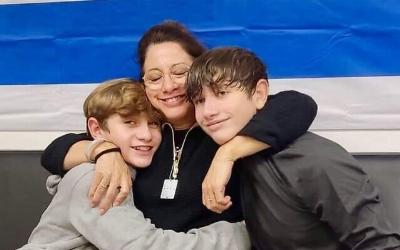Share
Human Rights Voices
While the UN devotes its human rights operations to the demonization of the democratic state of Israel above all others and condemns the United States more often than the vast majority of non-democracies around the world, the voices of real victims around the world must be heard.
Palestinian Authority/Gaza, December 1, 2023
Relative of freed captives say Hamas branded child hostages in case they escaped
Original source
A relative of hostages released by Hamas terrorists this week said that children were branded after they were kidnapped to prevent their escape, as other family members described abuse and neglect experienced by captives during their time in the Gaza Strip.
The uncle of brothers Yagil (12) and Or Yaakov (16), who were freed Wednesday, said Palestinian terrorists branded the boys using the exhaust pipe of a motorcycle after they were abducted to Gaza on October 7.
“They told us stories about what they went through inside Gaza. The stories are horrible,” Yaniv Yaakov said during an event in North Macedonia with Foreign Minister Eli Cohen.
“Each child that was taken by Hamas was taken on a motorbike and they took every child, took his leg and put it on the exhaust of that motorbike, so they have a burn so they will be marked if they run, if they escape, so [Hamas] can find them.”
“They were drugged, they were treated so badly, but at least they are with us,” Yaakov added, but did not elaborate on what substance they were given.
The aunt of Mia Schem (21), who was freed Thursday, said a Palestinian veterinarian operated on her arm while she was held hostage in Gaza.
“She underwent trauma. She’s thin, she’s weak,” Vivian Hadar told reporters after her niece was released earlier today. “A veterinarian operated on her arm. She did physical therapy for herself.”
“We’re happy she’s with us. It’s really tough to see her like this,” Hadar added.
Schem was apparently shot in the arm when taken hostage at the Nova music festival.
Moran Aloni, whose sisters Danielle and Sharon and three nieces were returned from captivity this week, said “‘minimal conditions’ would be an exaggeration” to describe what they went through while held hostage.
“There wasn’t food every day. And if there was something one day it was not something you could count on to satisfy you. It kept them alive,” he told Channel 12, adding sometimes they would need to decide whether to save food for the evening since they weren’t sure if they’d receive something else.
Sharon’s husband David, also held hostage by Hamas, was initially held together with his wife, then later separated, Aloni said.
The captors also tried to dampen their spirits, telling them that “Israel gave up on them.”
“And it was something they felt — that Israel decided arbitrarily to raze everything. They had no idea what was going on,” he said.
Doctors have said that hostages have lost weight in captivity, and parents have said their children are instinctively speaking in whispers after being forced to be quiet during their nearly two months of captivity.
A top Israeli doctor treating freed hostages said he’s heard testimonies that “are hard to bear” about their experiences in captivity.
Individuals have “undergone hardship, physically and mentally,” said Dr. Itai Pessach, Director of Safra Children’s Hospital at Sheba Medical Center, at a press conference.
“I feel the need to make their cry heard,” he said. “The world needs to know how evil and cruel the behavior of Hamas is.”
He said he is not sharing details due to patients’ privacy, and says it is for them to tell their stories to the public.
While details of the conditions have begun to emerge, most returning hostages have not yet spoken in detail about their ordeals. Many still have family members still being held by terror groups.
Hamas-led terrorists took about 240 hostages of all ages during the October 7 shock assault when it massacred some 1,200 people in southern Israel, most of them civilians.
A temporary ceasefire agreement, which began on November 24 but collapsed on Friday, saw 105 civilians released from Hamas captivity in Gaza: 81 Israelis, 23 Thai nationals, and 1 Filipino.
In exchange, Israel released 210 Palestinian security prisoners, all of them women or minors.
As of Friday morning, it was believed that 137 hostages remain in Gaza.

